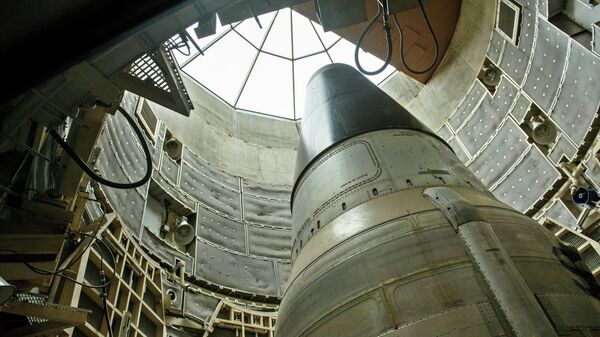Earlier in the week, media published a copy of a NATO report featuring the locations of US nuclear weapons in Europe. In particular, it has revealed the locations of US weapons at such bases as Kleine Brogel in Belgium, Buchel in Germany, Aviano and Ghedi-Torre in Italy, Volkel in The Netherlands, and Incirlik in Turkey.
Minor Embarrassment
"This is not a big surprise. I mean this is an embarrassment, but a minor embarrassment … I don’t see it as a major issue", Ramesh Thakur, director of the Centre for Nuclear Non-Proliferation and Disarmament (CNND) in the Crawford School, the Australian National University, said.
Joshua Pollack, a senior research associate at the Middlebury Institute of International Studies at Monterey, also believes that the leak would unlikely have any far-reaching consequences.
"I think this story is what we in Washington call a nothing burger. No one in the NATO alliance is really interested in discussing where the bombs are. Neither do they make any serious efforts at hiding the locations. So there will be no real repercussions. I doubt the subject will come up at the NATO summit later this year in London", Pollack said.
The leak does little damage to US interests in Europe, George Szamuely, a senior research fellow at the Global Policy Institute, said.
"Much of it has been well-known that the United States keeps nuclear weapons on the European continent and that the nuclear weapons are exclusively under the control of the United States", he said.
Nuclear Weapons Targeting Russia
What is a little bit new about this is that much has changed since the early 1960s when the United States first installed nuclear weapons in Europe, and the idea behind it could at least be justified as defensive, Szamuely said.
"The Soviet Union was believed to have an overwhelming conventional superiority over NATO, and in the event of the Soviet armed attack on the West it was believed that Russians would very quickly overwhelm Europe and NATO really would have no option other than resort to the nuclear weapons, which means the United States resorting to nuclear weapons. And therefore strategic deterrence was believed to be not credible because people did not think that the Americans were willing to sacrifice New York and Washington for the sake of Berlin or Paris. That is why the decision was taken to deploy these short-range missiles in Europe", he explained.
The problem is that, unlike the 1960s, now NATO has overwhelming conventional superiority over Russia, Szamuely said.
"There is not a slightest chance that Russia would attack anybody because the forces arrayed against Russia are much stronger. So what exactly is the purpose of these nuclear bombs in Europe? Well, the answer is pretty straightforward — and this document is pretty unambiguous about it — that these nuclear weapons will be used against Russia", he said.
Possible Consequences
Even though to certain circles this information has been an open secret, everyone is wondering what effect this leak might have on the US security and Washington’s ties with NATO, Pollack noted.
"One question is whether Moscow will decide to make an issue of it. It's possible, but I doubt it. It's not really in Russia's interest to highlight the question of the locations and numbers of non-strategic nuclear weapons", he said.
Popular protests against the stationing of nuclear weapons in Europe are unlikely, as leftists, who usually play upon these issues, have been in the forefront of the anti-Russian hysteria of the past decade, Szamuely said.
"So they are not in a good position to start now clamoring against the Americans having whipped up the hysteria about Russia all of these years", he explained.
The leak will unlikely change anything because the largest nuclear states are well aware of each other's arsenals, Thakur noted.
"We've known the countries, and we've known the numbers. Not the exact location. In other words, nothing really new. I’d be very surprised if the Russians were not aware of these exact locations. I’d be very surprised if the Americans don’t have a pretty good idea of the location of Russian weapons. This is something that is kept confidential in order to avoid public difficulties, but I don’t think it is any fundamental breach of a secret that has not been known before", he said.
The bigger issue right now is whether Russia and the United States will deploy new types of missiles after the Intermediate-Range Nuclear Forces Treaty (INF) will be suspended on 2 August, he noted.
"I don’t think that this [accidental disclosure of US nuclear arms locations in Europe] is playing into this [removal of US weapons from Europe]. This is happening about larger debate whether they need tactical weapons in Europe or whether they have got a purpose for that anymore, what is going happen with the INF and … renewing the New START [New Strategic Arms Reduction Treaty]", Thakur said.
The Trump administration in February announced that the United States would exit the INF treaty, which prompted Russia to do the same after the two sides exchanged allegations of treaty violations. The US suspension of the INF treaty becomes official on 2 August.
The INF treaty, signed in 1987, required both parties to eliminate and permanently forswear all of their nuclear and conventional ground-launched ballistic and cruise missiles with ranges of 500 to 5,500 kilometers (310 to 3,417 miles).
Views and opinions expressed in this article are those of the speakers and do not necessarily reflect those of Sputnik.

